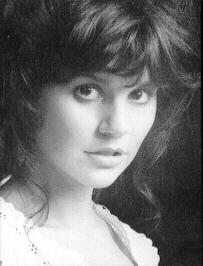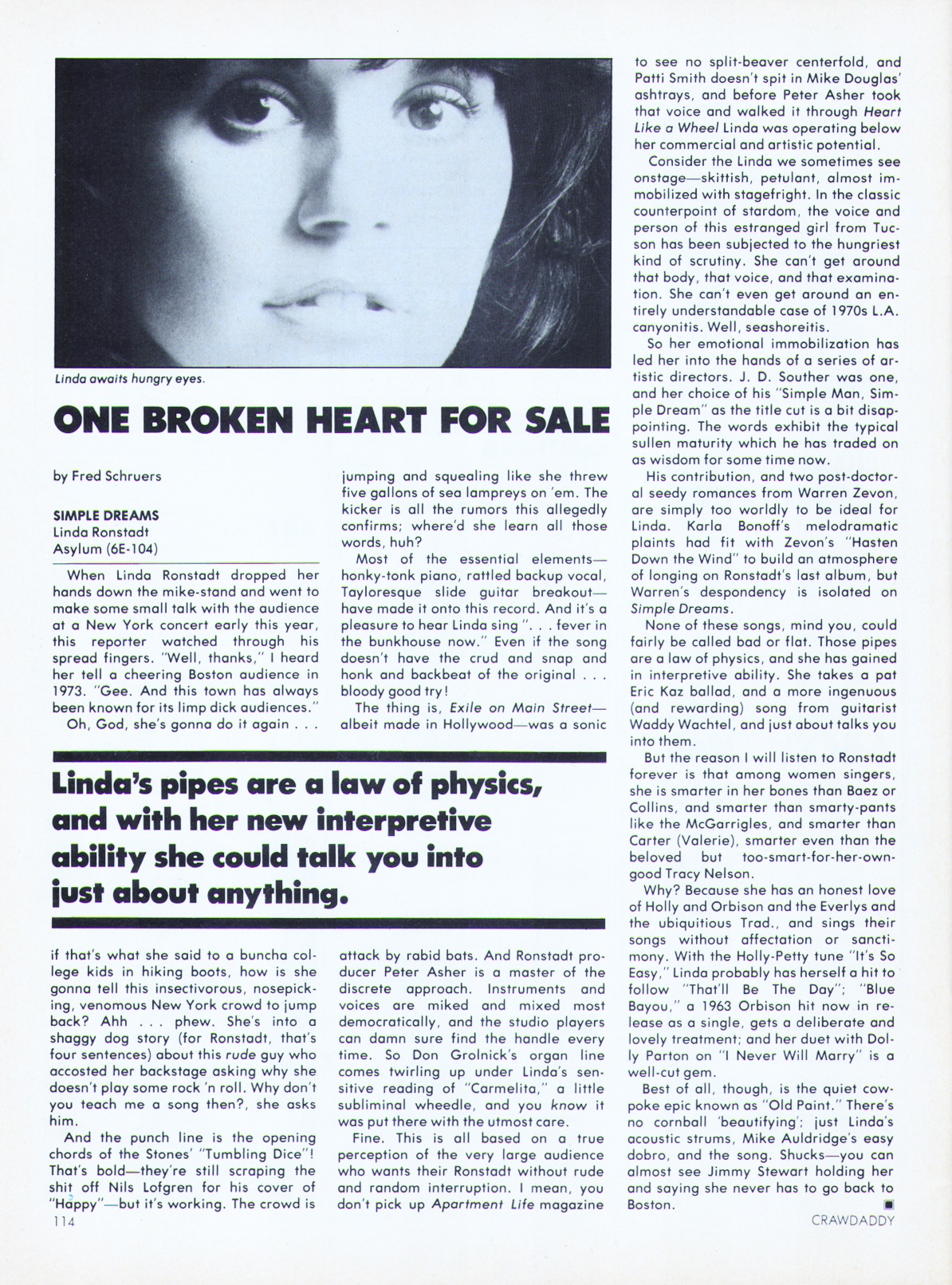

| ONE BROKEN HEART FOR SALE |
|---|
| SIMPLE DREAMS: Linda Ronstadt |
|
When Linda Ronstadt dropped her hands down the mike-stand and went to make some small talk with the audience at a New York concert early this year, this reporter watched through his spread fingers. "Well, thanks," I heard her tell a cheering Boston audience in 1973. "Gee. And this town has always been known for its limp dick audiences."
Oh, God, she's gonna do it again . . . if that's what she said to a buncha college kids in hiking boots, how is she gonna tell this insectivorous, nosepicking, venomous New York crowd to jump back? Ahh..... phew. She's into a shaggy dog story (for Ronstadt, that's four sentences) about this rude guy who accosted her backstage asking why she doesn't play some rock'n roll. Why don't you teach me a song then?, she asks him. And the punch line is the opening chords of the Stones' "Tumbling Dice"! That's bold- they're still scraping the shit off Nils Lofgren for his cover of "Happy"- but it's working. The crowd is jumping and squealing like she threw five gallons of sea lampreys on 'em. The kicker is all the rumors this allegedly confirms; where'd she learn all those words, huh? Most of the essential elements- honky-tonk piano, rattled backup vocal, Tayloresque slide guitar breakout- have made it onto this record. And it's a pleasure to hear Linda sing ". . . fever in the bunkhouse now." Even if the song doesn't have the crud and snap and honk and backbeat of the original . . . bloody good try! The thing is, Exile on Main Street- albeit made in Hollywood- was a sonic attack by rabid bats. And Ronstadt producer Peter Asher is a master of the discrete approach. Instruments and voices are miked and mixed most democratically, and the studio players can damn sure find the handle every time. So Don Grolnick's organ line comes twirling up under Linda's sensitive reading of "Carmelita," a little subliminal wheedle, and you know it was put there with the utmost care. Fine. This is all based on a true perception of the very large audience who wants their Ronstadt without rude and random interruption. I mean, you don't pick up Apartment Life magazine to see no split-beaver centerfold, and Patti Smith doesn't spit in Mike Douglas' ashtrays, and before Peter Asher took that voice and walked it through Heart Like a Wheel Linda was operating below her commercial and artistic potential. Consider the Linda we sometimes see onstage- skittish, petulant, almost immobilized with stagefright. In the classic counterpoint of stardom, the voice and person of this estranged girl from Tucson has been subjected to the hungriest kind of scrutiny. She can't get around that body, that voice, and that examination. She can't even get around an entirely understandable case of 1970s L.A. canyonitis. Well, seoshoreitis. So her emotional immobilization has led her into the hands of a series of artistic directors. J. D. Souther was one, and her choice of his "Simple Man, Simple Dream" as the title cut is a bit disappointing. The words exhibit the typical sullen maturity which he has traded on as wisdom for some time now. His contribution, and two post-doctoral seedy romances from Warren Zevon, are simply too worldly to be ideal for Linda. Karla Bonoff's melodramatic plaints had fit with Zevon's "Hasten Down the Wind" to build an atmosphere of longing on Ronstadt's last album, but Warren's despondency is isolated on Simple Dreams. None of these songs, mind you, could fairly be called bad or flat. Those pipes are a law of physics, and she has gained in interpretive ability. She takes a pat Eric Kaz ballad, and a more ingenuous (and rewarding) song from guitarist Waddy Wachtel, and just about talks you into them. But the reason I will listen to Ronstadt forever is that among women singers, she is smarter in her bones than Baez or Collins, and smarter than smarty-pants like the McGarrigies, and smarter than Carter (Valerie), smarter even than the beloved but too-smart-for-her-own-good Tracy Nelson. Why? Because she has an honest love of Holly and Orbison and the Everlys and the ubiquitious Trad., and sings their songs without affectation or sanctimony. With the Holly-Petty tune "It's So Easy," Linda probably has herself a hit to follow "That'll Be The Day"; "Blue Bayou," a 1963 Orbison hit now in release as a single, gets a deliberate and lovely treatment; and her duet with Dolly Parton on "I Never Will Marry" is a well-cut gem. Best of all, though, is the quiet cowpoke epic known as "Old Paint." There's no cornball 'beautifying'; just Linda's acoustic strums, Mike Auldridge's easy dobro, and the song. Shucks- you can almost see Jimmy Stewart holding her and saying she never has to go back to Boston. |
